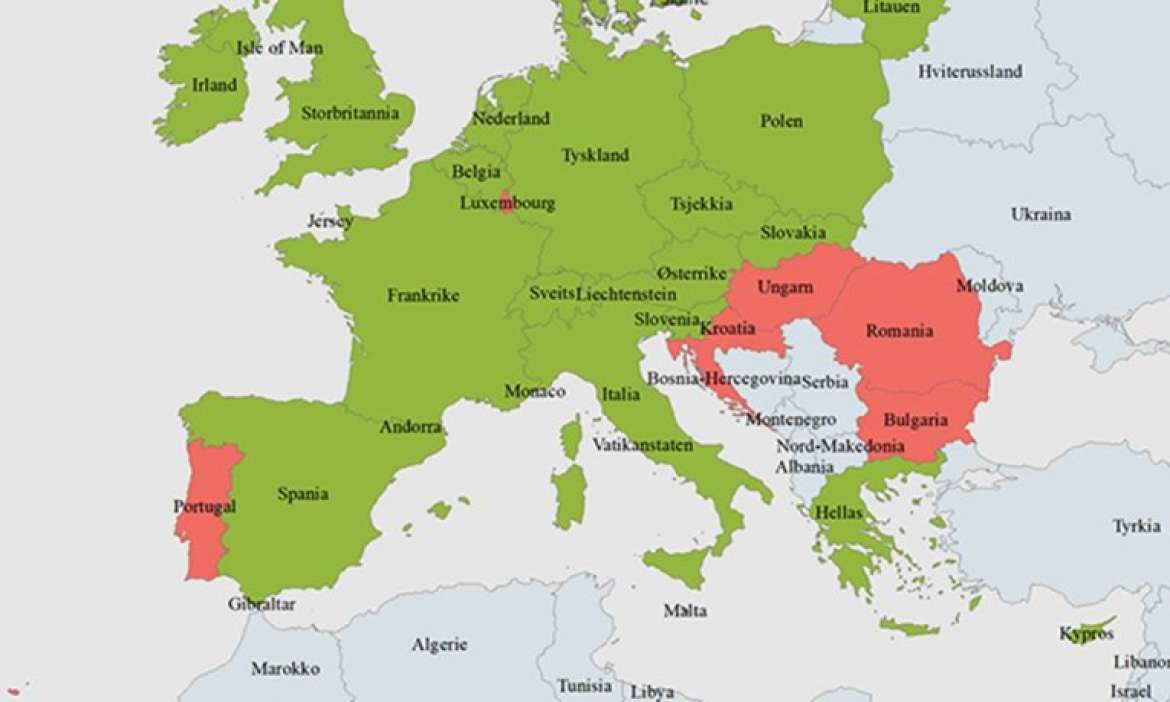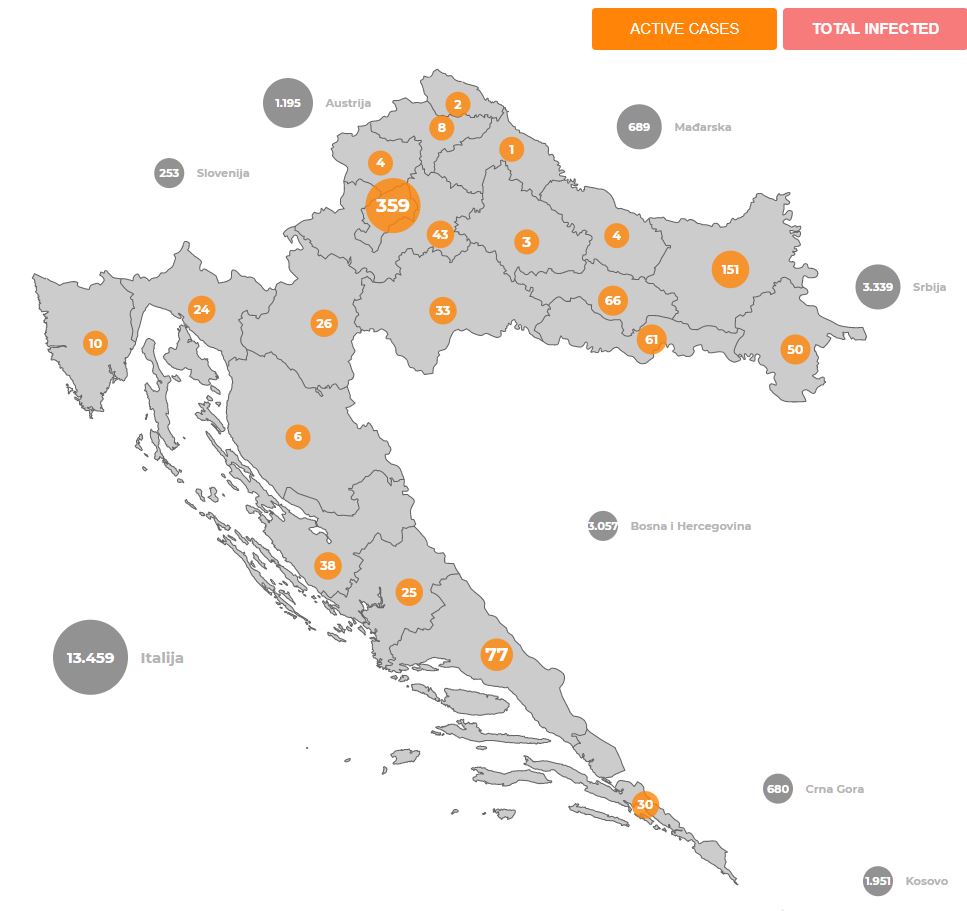July 11, 2020 - Croatia has seen a spike in COVID-19 cases in recent days in the peak tourist season - are they more due to tourist arrivals or unenforced measures?
It is 38 days since Croatia's Minister of Tourism Gari Cappelli met with me at his ministry to discuss a number of tourism issues. At the time, Croatia held the EU Presidency, and therefore he was the most important man in European tourism. At the end of the meeting, I asked for an on-the-record interview, to which he agreed on condition that he would authorise the interview prior to publication. He argued that it was sensitive EU information, and so I agreed. In the end, only one word was added to the article I sent for approval. You can read the full interview here - Exclusive Interview: EU Presidency Tourism Minister on Border Openings, Air Bridges and More - but I want to focus on one question from the interview:
What about external EU borders and continental flights?
We are currently working with the airlines towards an opening of external borders on July 1, but ONLY for countries which have a good epidemiological situation.
Exactly four weeks after that interview, Germany took over the EU Presidency, and new rules for the EU's external borders were announced. As Minister Cappelli hinted, there was a 'safe list' of 15 non-EU/EEA countries with good epidemiological records who were included in the list.
That list did not include the United States, and so travel to the Schengen zone for tourism for Americans was not possible without special circumstances. But there was one EU country which decided to welcome Americans and anyone else with a pulse if they could get to its border.
Croatia.
Unshackled by the rules of Schengen, Croatia had a little more freedom to make up its own rules. With four days to the general election, and a tourism minister now unburdened with EU presidency duties who famously announced in perhaps the finest corona motto ever - Croatia Breathes Tourism - the Kingdom of Accidental Tourism's Balkan solution for tourism continued. Anyone could enter with proof of paid accommodation (to make the visit an economic one). No temperature check, no test required, no self-isolation.
It is worth taking a second to see how other tourism countries have prepared for this most unusual of seasons - meet Turkey. Safe Tourism Certificate Program: How Turkey is Handling Tourism, Reports Croatian Correspondent.
The ruling party ran a successful campaign on the slogan #SigurnaHrvatska (Safe Croatia) and were returned to power with a large increase in seats in Parliament. Life was good.
And then the New York Times did a story on places that Americans can travel and told the world what we had been telling people for weeks in our little Total Croatia Travel INFO Viber community.
Global interest in the story grew. CBS News found our Viber community and contacted me for more background on the story. Last night Forbes published an article featuring TCN extensively.
And then, late last night, 5 days after the election and 9 days after the new EU border directive, and 2 days after the NY Times story, a sudden - and immediate - clampdown. No more entry with just paid accommodation for anyone outside the EU/EEA/UK - a recent negative test or quarantine on arrival would be necessary.
No more Balkan solutions, now everything was transparent and out in the open, as TCN has tried to be throughout this saga.

One of the biggest ironies, to me at least, is that Croatia won praise all over the world for its fantastic initial response. And it WAS fantastic. Then the economy, tourism and ultimately politics entered the equation. And so now we have the situation that countries such as Norway have Croatia on a red list, while they give the green light to the UK, for example.
Croatia is on Slovenia's yellow list as well, and even the UK - one of the worst countries for infections - almost left Croatia off its list of countries to visit without mandatory self-isolation on return.
Was this spike in cases caused by tourists?
I have seen a couple of stories of an American and a Swede being infected, a lot more of people returning from Bosnia, Serbia and Kosovo and bringing the infections with them - two nuns from Djakovo brought it back from Kosovo and now there are dozens of infections. If you look at the map of active cases (as of 13:00 on July 11), it shows that the main hot spots are not the coast, but Zagreb and Slavonia - presumably due to contact with the worse situation across the eastern borders.
Could the rise of infections also be due to unenforced measures?
One of the observations I have had through the Total Croatia Travel INFO Viber community is how shocked tourists are from countries badly affected by corona at how relaxed things are in Croatia.
I am too.
Croatia introduced new measures on June 24, requiring masks to be worn on public transport. I have been on a ferry and a bus since then. On the ferry, I wore my mask, as did the crew and perhaps 10% of passengers. On the bus from Zagreb to Split, the bus conductor, who was checking the tickets and in contact with everyone on the bus, did not wear a mask.
As the Premier League resumed in the empty stadia of Anfield, Old Trafford and Stamford Bridge, Croatia was busy organising the Djokovic Adria Tour with fans packed inside the stadium, despite it being reported several days earlier that Djokovic had been in contact with an infected basketball player in Belgrade. The Prime Minister came, was photographed touching Djokovic for a photo op, then next to Goran Ivanisevic. Both tennis icons subsequently tested positive, but PM Plenkovic decided not to self-isolate, as Angela Merkel had done, for example. This was 12 days before a bruising election.
It was - at least to me - the mirror image of Boris Johnson's Chief of Staff, Dominic Cummings - one rule for us, one rule for you.
And with such leadership, why bother to follow the rules yourself? Few people are following them, so why not enjoy that big wedding and kiss the bride.
We all have our own corona story, perspective and experiences. Not so many of us have been to several countries since lockdown. I have, and I think it is worthwhile sharing a few observations to add to the discussion.
I self-isolated on idyllic Hvar, 63 days of island bliss. As such, my viewpoint is necessarily different from someone holed up in an earthquake-ravaged apartment in Zagreb for months, or Queens in New York City.
There have been two cases on Hvar, both imported from Austria from locals returning from jobs. I was terrified when I heard of the first, just 3km from our home. But the fear passed, as did the infection. My lockdown was spent on an essentially corona-free island, one of the most beautiful in the world.
I was nervous on that first trip to the mainland after 63 days. What would Zagreb be like? All socially distanced and masked up? The first bar I passed shocked me. No masks in sight, people packed in like sardines.
There were other places, of course, that took things more seriously. Sanitiser was everywhere, but I quickly realised that it was more a legal requirement for many. Handshakes, hugs, all as before, but with some more cautious folk keeping their distance. Some shops insisted on keeping distance until the current customer was out of the building, but they were few and far between. People joked - do we shake hands and hug, or do the elbow greet? Looking back, I guess they were just happy to be outside after all the confinement. They hadn't had the luxury of gorgeous Hvar.
I was invited to go on a business trip to Munich, Luxemburg and Brussels. I was curious how things were in other countries, as well as the business itself in the trip. But should I go? Looking around at the tourists mingling, the hugging and the lack of adherence to measures in general, what to do? I could always self-isolate in Varazdin and get some work done.
It was a fascinating trip on all levels.
In Austria, we stopped for fuel, put on our masks and entered the shop. The shop assistants had their masks on but several customers did not. There was no enforcement.
In Germany, they were MUCH stricter. No mask, no entry.
In Luxemburg and southern Belgium, it was more a feeling of 'if you want to do the mask thing then we will.'
In Brussels, it was more like Zagreb, but with more masks. But not that many more.
And then we came to Munich on the way back, where our contact urged us to hurry for all bars and restaurants shut at 10pm? Really? And not only that - if you entered a restaurant, it was with a mask and you left your name and number so that they could contact you in the event of an outbreak. The same in shops, the same on the U-Bahn. There were no examples of people not adhering to the system. The rules were the rules, and Germans were abiding by them, which is probably why they are so shocked at what they are finding in Croatia.
I was stunned - and a little terrified - at the ease with which the Croatian police confined us to our homes in March. So simple, so effective. They could have cut the phones, TV and internet, and we would have been back in the Middle Ages.
Why are the measures not being enforced as strictly now? The election, the season, corona is not that real as we contained it so well, who knows? If the Prime Minister can hang out with COVID-positive tennis stars with impunity, what makes it so different for the rest of us?
My opinion on corona doesn't matter, as I am not an expert.
Will there be less infections with less tourists? Yes.
Will there be less infections if measures are enforced? Yes.
Does the corona tourism risk outweigh the economic benefits, and are we ready to adhere to stricter measures to combat the virus?
Those are questions I cannot answer - one for Dominic Cummings wannabes, perhaps?
For the latest travel info, bookmark our main travel info article, which is updated daily.
Read the Croatian Travel Update in your language - now available in 24 languages
Join the Total Croatia Travel INFO Viber community.
The Netherlands - as of July 21, Croatia is placed on the "Orange" list by the Dutch government, which means that both the Croatian nationals and the Dutch nationals returning to the Netherlands from Croatia are strongly advised to self-quarantine for 14 days.



